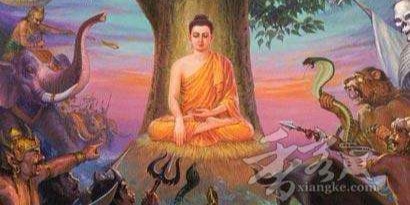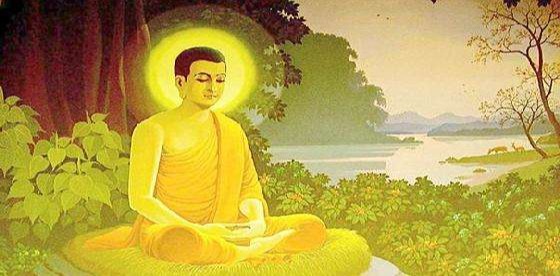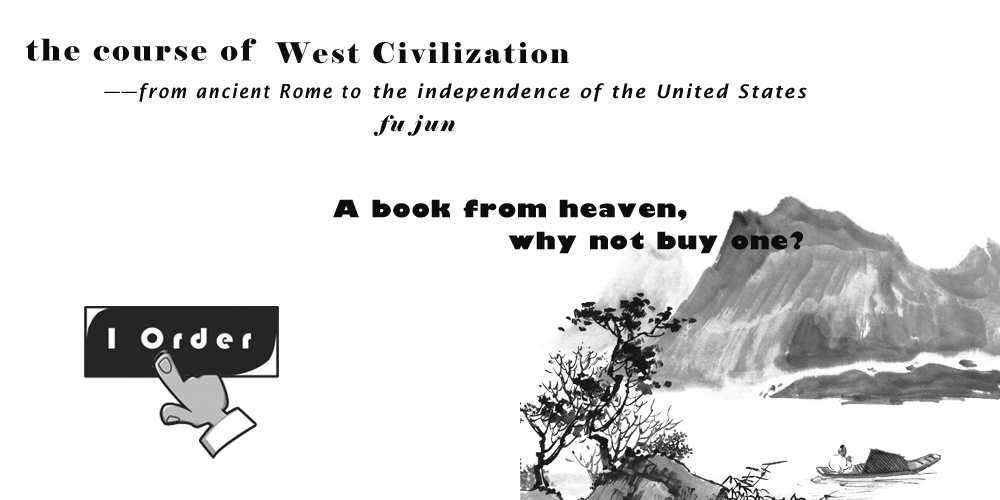West all think that humans are born with suffering?
preface
This is the first subsection of section 3,” Greedy and degenerate of human nature” of Chapter 1, “Religion and life,” the first part of “The History of Western Civilization”. I renamed it “Why do great thinkers in the East and the West all think that we are born with suffering?” This subsection demonstrates the human nature of suffering from Freud’s subconscious and Buddhist theory. People are born with pain, and we are always surrounded by pain; then, the nature of suffering determines the greed and degeneration of humans. At the same time, it discusses that Christianity also believes that the essence of humans is pain. Humans make mistakes in heaven and are punished by God to atone for their sins on earth and come to the world with the original sins of greed for pleasure and tending to crime. We are bound to feel pain for these immoral original sins. Therefore, the great thinkers of the East and the West are interlinked in essence and believe that life is suffering, This is also the subject of this section.
religion determines the customs of human life, power of religion can be seen

We people are born with annoyance and suffering. We are not surrounded by bother and agony nowhere.
Life is suffering. Shakyamuni’s understanding of this is sharp and clear. He believes that there are eight sufferings in life: Birth, old age, illness, death, resentment and hatred, inability to seek, love but separation, and the prosperity of the five netherworlds. This discussion seems detailed enough but can’t exhaust life’s annoyance and suffering. I read Freud’s “interpretation of dreams “when I was young. I was stunned after reading it. Human beings had so many inexplicable bother and agony and so many unheard-of psychological obstacles. This eagle-eyed older man wearing round-rimmed glasses revealed the human spiritual world nakedly. He believed that unfulfilling subconscious wishes caused this annoyance and suffering. He tried to alleviate the conflict between the subconscious and reality by interpreting dreams, releasing mental pressure, and decreasing annoyance and suffering. Still, the practice has proved that this method is ineffective. We can’t deny that Freud is a great psychologist and even a great philosopher. He challenged the annoyance and suffering of our life. Since then, psychoanalysis, an unpopular subject, has become a perennial topic in mainstream culture. Doesn’t it just show that annoyance and suffering are the essence of humans and cause unprecedented resonance? Psychoanalysis has far less influence on psychology than thinking and art because psychology believes itself to be a science. However, science needs to test their views through repeated experiments; other psychological schools always practice that, only Freud’s psychoanalysis can’t. It is not surprising that psychoanalysis regards psychology as speculation. Freud’s greatness lies not in psychology but philosophy. On the basis of Schopenhauer, Freud discussed the human nature of annoyance and suffering from a more empirical perspective, which was the actual value of Freud. The real world of human beings is beyond quiet and peaceful, a rational world as we usually think of, but irrational, in endless annoyance and suffering. Freud completely opened Pandora’s magic box of irrationality. So far, we know that humans are irrational rather than rational. The wave of irrationality suddenly flooded the philosophical and ideological worlds, and many irrational philosophies were born based on Freud. Henceforth, human history’s rational and noble words have been ruthlessly deconstructed, including country, nation, religion, love, and eternity. All these are illusory and pale. Only humans’ own existence is real, and only humans’ own feelings exist. These thoughts make humans crazier to pursue their own existence and enjoyment. In a sense, Freud really opened Pandora’s magic gate and brought more annoyance and suffering to humans.

Welcome to https://www.amazon.com/dp/B0BQF77K3D to buy the Kindle ebook“the course of western civilization(essence version)”

We are always in an endless stream of annoyance and suffering. bother and agony seem like shadows of ourselves; we can’t eliminate them. One dispels, but another rises immediately. Sometimes we remove them under the brow, but they soon come up to the heart. Sometimes our hearts are in knots and can’t be unraveled. Sometimes our endless annoyance is just like spring waters flowing eastward, going on forever. Sometimes when you are riding high, they stealthily jab into your heart like a small poisonous thorn, and the pain at this time is always deeper and more difficult to cast off.
Dr. Wright in “the silent lamb” is an excellent psychiatrist, but he is a perverted ogre. This sharp contrast is the film’s gimmick, the biggest meaning embodied in this film. It is the main reason the film won the Oscar but felt meaningless to many people. Let’s guess Dr. Wright’s spiritual world. As a psychiatrist, the mental pain at the general level did nothing for him. He could reasonably solve and release them, but much more profound and awkward pain emerged, and he deeply got stuck in it and was unable to get out. At the same time, he contacted too many mental cases as a psychiatrist. Facing such a complex and disordered spiritual world, he finally couldn’t bear to collapse completely and become an ogre. Each of us has too many troubles; It is really a question of whether we can afford the pain of others. Dr. Wright could incisively analyze the psychology of others, but he couldn’t save his soul. The biggest edification of this film is that spiritual problems may not be resolved by human knowledge. Ordinary people can not bear the mystery, disarray, and disorder of the human spiritual field. Personally, although I always respect psychologists and psychiatrists, I will never engage in psychology and psychiatry. I think that they work in a more dangerous field than the battlefield full of bullets. Their exploration of the human spiritual world perhaps brings genuine happiness to humans, but it will carry great harm to these psychologists themselves. Barton said with a poetic feeling that he was willing to die under the last bullet in the last-ditch, but the spirit’s suffering is far more terrible than the instantaneous death.


Freud first expounded on the phenomenon of the subconscious is another tremendous achievement. The subconscious phenomenon has been known to humans for a long time. Humans had practiced hypnosis long ago. However, Freud was the first to confirm the existence of the subconscious. And he also affirms through hypnosis. The subconscious is empirical and verifiable; There is no need to discuss this.① Then, the concepts of subconsciousness, unconscious memory, collective unconsciousness, and so on continue to appear. He has raised humans’ understanding of the spiritual world to a new depth. The subconscious can be linked with the human moral law. Kant believes that morality comes from the moral law of the human inner world. Isn’t this moral law human subconscious? Since then, the moral law can be regarded as an actual existence rather than a philosophical hypothesis. We can also connect the subconscious with the vast universe. The subconscious is connected with the moral law; the moral law comes from the depths of the universe. Therefore, aren’t we tied with the mysterious forces of the universe through the subconscious? And we can connect the subconscious to the most fundamental problems of humans, such as where life comes from, where death will go, what are immortality and eternity, religion, and the ultimate world? This is actually the great of Freud.
Freud explained religion as the sexual impulse in the collective human subconscious of the early stage, so I think some of Freud’s theory is preposterous. However, he did open a bright road in front of us, pointing a better or the only direction to a more scientific explanation of religion. Connecting the subconscious with religion may be the most outstanding achievement in the history of human thought. At least, I think so, but until now, it seems most people have not realized the enormous potential value of subconscious theory to religious belief. Religion has been used to alleviate human annoyance and suffering for thousands of years. It is also the only way to resolve human annoyance and suffering. Only through religion and the existence associated with the mysterious universe can humans really release spiritual pain. In addition, there is absolutely no other way. Human spiritual pain can not be resolved at the level of rationality and knowledge. Humans can more scientifically understand their souls and the inner world through the subconscious. The combination of subconscious and religion can provide a better perspective for humans to explain religion scientifically, give wings to religion, and bring a solid theoretical basis for human happiness and sublimation. These are great blessings for humans. Although the road is hard and long and may never end, we know that this road is better than random exploration. Perhaps we walk and walk, and suddenly we come to the end of the road.

Welcome to https://www.amazon.com/dp/B0BQF77K3D to buy the Kindle ebook“the course of western civilization(essence version)”

In history, Sakyamuni, the founder of a religion, explained the human essence of annoyance and suffering most profoundly and clearly. Did he also demonstrate the close relationship between the subconscious and religion? Because through the subconscious, we know that the essence of humans is trouble and pain. From the ordinary people’s perspective, Sakyamuni, a prince, has nothing to worry about and suffer. He possessed power, wealth, fragrant carriages, precious horses, and beauty, all ordinary people’s long dreams. But it is he who points out that there are eight hardships in life, birth, old age, illness, death, resentment and hatred, inability to seek, love but separation, and the prosperity of the five netherworlds.② Moreover, he was the first to enlighten and become a Buddha. Perhaps only at his level, after enjoying all the glory and splendor of life, he could truly understand life and feel the real pain of life, some pain that people could no longer avoid. It is said that one day Sakyamuni went out and met a funeral procession. The scene of life and death was overwhelmed with grief; everyone cried their heart out. No one could escape death. The fear of death deeply touched him, but who could escape the fear of death? As a prince, he did not have this privilege. Death is the ultimate pain of which human beings can never get rid. Therefore, he decided to become a monk and seek the ultimate way to eliminate this ultimate pain. Of course, these are just legends. Sakyamuni can’t choose to become a monk because of a scene or an insight.
More likely, as a wise man with sensitive feelings and profound thoughts, he had been thinking about what humans are? Where did life come from, and where would death go? These problems and the fear of death had lingered in his mind for ages. In every night of singing and dancing in the lap of luxury, every day of drinking and sleeping away his life with dreams, the shadow of death never quitted him for a moment. He knew that no matter how these high-and-mighty heroes and striking women were, they could not escape death. In the end, they were a pile of bones, and death lay in front of each of us. Therefore, he may have long regarded transcending death as his greatest goal in life.
We have talked about transcending death and pursuing immortality and eternity as the direct cause of all religions. It must also be the real reason why Sakyamuni decided to become a monk. It is the biggest dream hidden in his heart. When he met the funeral procession, it made him finally determined to realize his dream. The funeral procession only was a decisive factor. Sakyamuni determined to become a Buddha or die; he sat under the bodhi tree for seven days and seven nights and finally comprehended the realm of Nirvana, obtained the true meaning of life, and transcended death. What insight did he get? Did he really surpass death? He transcended into the nirvana realm without death, which we may never achieve, but some of his epiphanies could give us much enlightenment.


Sakyamuni believed that the pain of our life comes from our immersion in the pleasure brought by the six senses – eyes, ears, nose, tongue, body, and mind, that is, ignorance.③ Six senses bring us the pleasure of sound, color, taste, food, sex, and reputation. Here, I identify the pleasure generated by the ‘body’ as sexual pleasure because apart from the eyes, ears, nose, and tongue, the sex organ is the only part of the body that can strongly bring us pleasure. As for” reputation”, I personally think it is the most attractive and harmful to people in secular life. Sakyamuni considers that we indulge in the pleasure of the six senses, can’t extricate ourselves from these pleasures, and can’t realize life’s essence and real meaning. He believes that through the practice of seclusion and abstinence, we can make the six roots pure and clear, prove the supreme consciousness, reach the nirvana realm of eternal life and eternity, and break away from the cycle of life and death. Whether Nirvana can actually be achieved through this method, as a layman, I can’t comment because I can’t even practice “abstention.” Therefore, how can I understand the depth of practice and the broad and profound breadth of Buddhism? For the time being, we don’t regard Sakyamuni as the founder of Buddhism but as a thinker and philosopher. His discussion on the essence of human annoyance and pain is incisive and penetrating. It can be said that no one has reached it since ancient times. He clearly discerned that human beings are immersed in the pleasure brought by senses and pointed out that this sensual pleasure is the root of annoyance and pain. These views make us suddenly enlightened, just like pulling out the clouds to see the sunlight. They also show that Sakyamuni is a great thinker anyway.
Note:
① Freud “the interpretation of dreams”, trans, Zhu Gengsheng, The Chinese Overseas Publishing House
② Fang Litian “Buddhist philosophy”, China Renmin University Press , p. 74-80
③Fang Litian “Buddhist philosophy”, China Renmin University Press ,p. 280-290

Welcome to donate and support. Your support is the biggest driving force for the author’s writing. I believe it is also support for God and God’s cause. Friends with WeChat and Alipay can click on the QR code below to donate.

Friends without them can use the following PayPal account to donate, https:/ /www.paypal.me/readjoyinc.
 the course of Western Civilization
the course of Western Civilization










